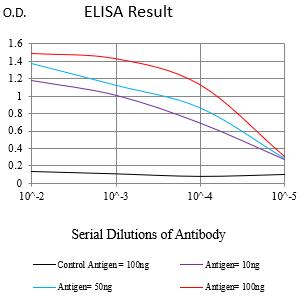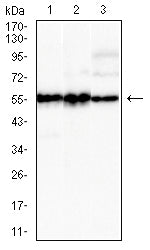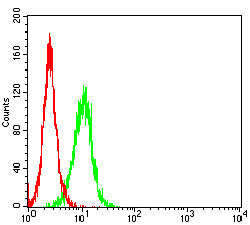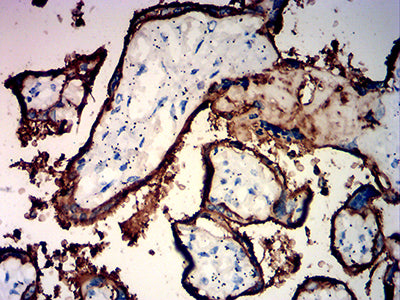



| WB | 咨询技术 | Human,Mouse,Rat |
| IF | 咨询技术 | Human,Mouse,Rat |
| IHC | 咨询技术 | Human,Mouse,Rat |
| ICC | 技术咨询 | Human,Mouse,Rat |
| FCM | 咨询技术 | Human,Mouse,Rat |
| Elisa | 1/1000-1/5000 | Human,Mouse,Rat |
| Aliases | GCAP; ALPPL; ALPPL2 |
| Entrez GeneID | 251 |
| clone | 3C5A7 |
| WB Predicted band size | 57.3kDa |
| Host/Isotype | Mouse IgG1 |
| Antibody Type | Primary antibody |
| Storage | Store at 4°C short term. Aliquot and store at -20°C long term. Avoid freeze/thaw cycles. |
| Species Reactivity | Human |
| Immunogen | Purified recombinant fragment of human ALPG (AA: 170-285) expressed in E. Coli. |
| Formulation | Purified antibody in PBS with 0.05% sodium azide |
+ +
以下是关于ATG4B抗体的3篇参考文献的示例,包含文献名称、作者及摘要概括:
---
1. **文献名称**:*ATG4B regulates autophagosome maturation and influenza virus replication*
**作者**:Marjuki H et al.
**摘要**:该研究探讨了ATG4B在自噬体成熟及流感病毒复制中的作用。通过使用ATG4B特异性抗体进行免疫印迹和免疫荧光实验,发现抑制ATG4B会阻断自噬体与溶酶体的融合,从而抑制病毒复制,表明ATG4B是病毒利用宿主自噬机制的关键因子。
2. **文献名称**:*Structural basis for ATG4B-mediated processing of LC3 and its regulation by post-translational modifications*
**作者**:Satoo K et al.
**摘要**:文章解析了ATG4B的晶体结构及其对LC3蛋白的酶切机制。通过ATG4B抗体进行免疫共沉淀实验,揭示了磷酸化修饰对ATG4B活性的调控,为开发靶向ATG4B的自噬调节药物提供了结构基础。
3. **文献名称**:*Dysregulation of ATG4B in colorectal cancer promotes tumor progression*
**作者**:Li M et al.
**摘要**:研究分析了结肠癌组织中ATG4B的表达水平及临床意义。利用ATG4B抗体进行免疫组化检测,发现其高表达与肿瘤转移和不良预后显著相关,机制研究表明ATG4B通过增强自噬促进癌细胞侵袭。
---
**注**:上述文献为示例,实际引用时需根据具体研究内容核实作者、标题及摘要细节。建议通过PubMed或Google Scholar以“ATG4B antibody”或“ATG4B autophagy”为关键词检索最新文献。
ATG4B antibodies are essential tools for studying the role of ATG4B, a key cysteine protease in autophagy regulation. Autophagy is a conserved cellular degradation process that maintains homeostasis by recycling damaged organelles and proteins. ATG4B specifically cleaves LC3 (Microtubule-associated proteins 1A/1B light chain 3) to expose a glycine residue, enabling its conjugation to autophagosomal membranes—a critical step in autophagosome formation. It also delipidates LC3 during autophagy termination, making it a central player in both initiating and resolving autophagic activity.
Researchers use ATG4B antibodies in techniques like Western blotting, immunohistochemistry, and immunofluorescence to detect protein expression levels, subcellular localization, and activity in various disease models. Dysregulation of ATG4B has been implicated in cancers, neurodegenerative disorders (e.g., Alzheimer’s), and metabolic diseases, driving interest in its therapeutic targeting. Antibodies targeting specific epitopes (e.g., catalytic domains or post-translational modification sites) help elucidate ATG4B’s functional states or interactions with inhibitors.
Both monoclonal and polyclonal ATG4B antibodies are available, often validated using knockout controls or activity-based assays. Their specificity is crucial for distinguishing ATG4B from homologous family members (e.g., ATG4A/C/D) and minimizing off-target effects in experimental data. These antibodies support drug discovery efforts, particularly in screening compounds that modulate ATG4B to restore autophagy balance in pathological conditions.
×